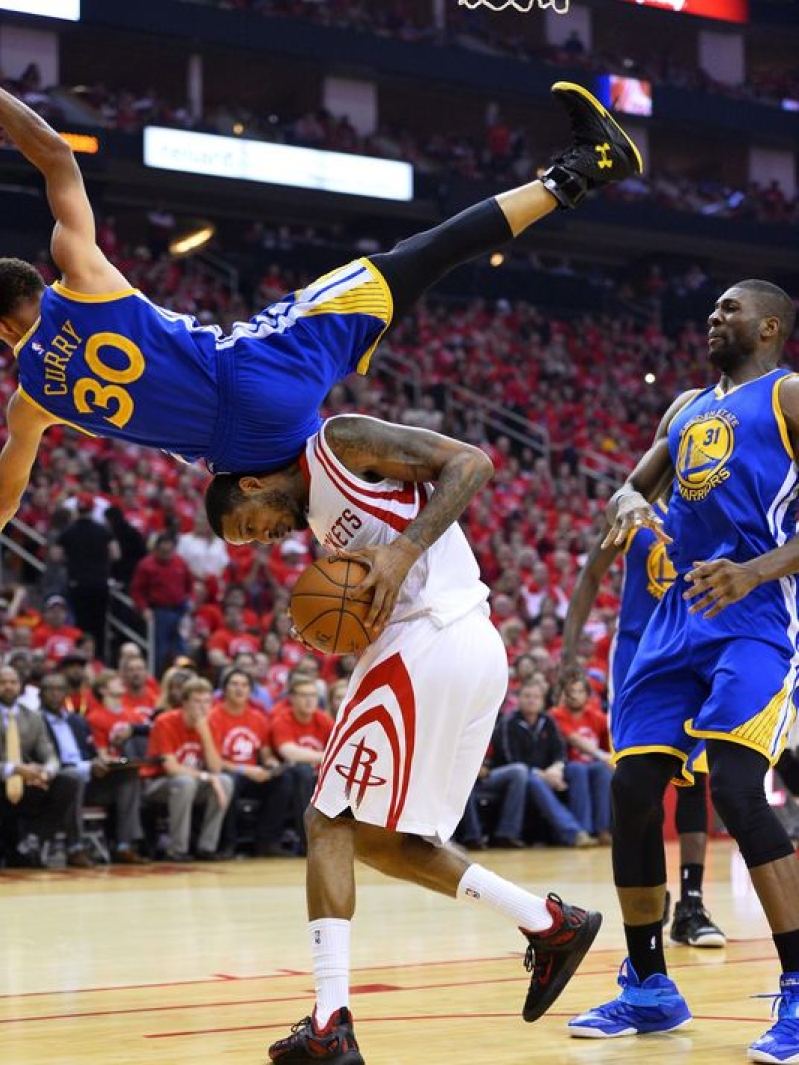
NBA MVP Stephen Curry took a hard fall, causing him to miss a portion of Game 4 of the Western Conference finals against the Houston Rockets on Monday. Although he is expected to be OK, his fall has brought up the issue of how the NBA deals with potential head injuries such as concussions and contusions.
According to a report from ESPN, the Golden State Warriors point guard missed the equivalent of a quarter after falling hard on his head, neck and back area during the second quarter against the Rockets, which won 128-115. The Warriors tested him for the symptoms of concussions and later cleared him to play, finishing with 23 points in 31 minutes.
"I feel pretty good," Curry said. "Just not now I envisioned the game going."
Curry added that it was the scariest fall in his career, although he didn't consider it his worst.
"I was in the air for a long time -- just trying to brace yourself," Curry quipped.
ESPN reported that the Warriors classified Curry's injury as a head contusion. The uncontrolled fall occurred after Houston's Trevor Ariza tried to shoot the basketball; Curry was called for a foul on the play.
"I wasn't exactly sure who it was; I was just trying to pump fake and get somebody off their feet," Ariza said. "I didn't know that he flipped over or whatever the case was. It wasn't intentionally or anything like that; I was just trying to make a basketball play."
Ariza added that it was "a scary situation" when Curry was escorted to the locker room after medical staff treated him under the observation of teammates and coaches.
"Both players were just trying to play hard and trying to make plays for their team, and unfortunately sometimes you get hurt," Ariza said. "But he's a tough kid and he came back out there and competed for his team."
Warriors general manager Bob Myers contended to ESPN that Curry did not suffer a concussion from his fall.
"If he did, he wouldn't have played," Myers said. "That's a pretty hard line."
According to Cindy Boren of the Washington Post, Curry underwent a head injury protocol from the NBA to rule out anything serious.
"There's a concussion protocol that all the team doctors and athletic trainers follow that I've been through before, I think two times in my career," Curry said. "I felt a lot better than I did those last couple times. That was good news on my end."
Curry elaborated on the tests the NBA gave him shortly after his fall.
"Rode the bike for a little bit, got my heart rate up and made sure that it didn't get worse," Curry explained. "Ran up and down the hallway, and all the balance tests and stuff like that."
The Warriors point guard added that he felt like he "was in the air for a long time."
"Once I hit the ground, you kind of hear voices from trainers and people just telling me to take my time and not rush yourself getting up," Curry said. "And want to make sure that you pass all the tests that they needed to do so that I could get back on the floor. So that's what happened."
Boren elaborated on the NBA's official concussion protocol. She noted that players undergo "a baseline brain function test each year, via a neurological and cognitive assessment."
"If a player is suspected of having a concussion, or exhibits the signs or symptoms of concussion, they will be removed from participation and undergo evaluation by the medical staff in a quiet, distraction-free environment conducive to conducting a neurological evaluation," Boren wrote, citing the NBA's official policy summary. "If a player is diagnosed with concussion, he will not return to participation on that same day."
Curry estimated that he was out for "probably an hour from the time I hit the ground to the time I got back in the game."
"You don't go through your regular routine, and it's a different kind of situation," Curry said. "It took me a couple minutes just to get back in the rhythm of the game. I was in the back watching the team make a comeback, in the locker room, so I kind of understood what we were doing differently to get back in the game."
Physician James Gilbert of the Centers for Advanced Orthopaedics elaborated to the Washington Post via email on the difference between concussions and contusions, which Curry suffered from according to the NBA.
"A contusion means that just the soft tissue has been injured - it doesn't involve any of the brain matter, so the brain itself was not injured," Gilbert wrote. "A concussion is a mild traumatic brain injury, where the brain matter itself has been injured."
However, Gilbert warned that Curry's head injury could potentially be reclassified as a concussion, given that its symptoms can develop later.
"You still need to be vigilant about a delayed onset of concussion," Gilbert wrote. "He might not have demonstrated symptoms initially, but 24-72 hours later, he may manifest symptoms of concussion. That's because if the brain matter and neurons are injured, they undergo chemical changes to create a lower electro-chemical threshold for exercise or cognitive challenges to create symptoms of concussions."
Gilbert hoped that the Warriors would keep a close eye on Curry's health and performance on the court, especially when it came to "cognitive or physical challenges."
"Even though he's not diagnosed with a concussion now, the team physicians and trainers need to be very vigilant and keep a close eye on how he's doing physically or cognitively," Gilbert wrote. "If he were to start demonstrating any of the red flags, they might have to re-assess the injury and re-label it as a concussion."
Curry told ESPN that he saw the replay of his fall on video.
"Once was enough," Curry quipped.







